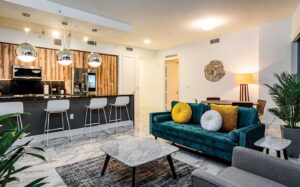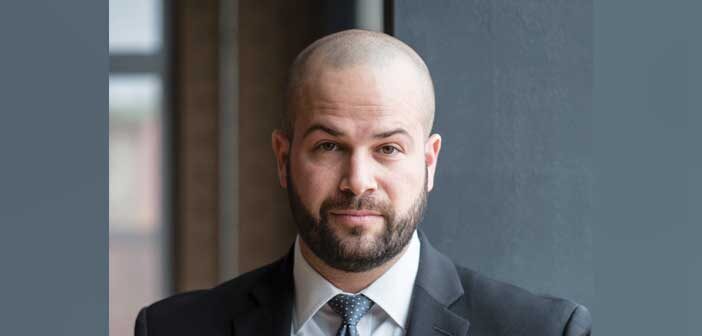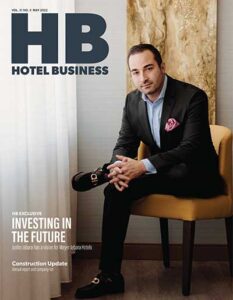When WhyHotel first launched, its founders knew that they were creating a new type of real estate asset class that “bridges the hotel and apartment world and is more valuable than either product alone,” according to Jason Fudin, one of its cofounders.
“When we started the company, we envisioned a flexible future, where the needs surrounding where we live and how we travel converge,” he added. “…Well, that future came even quicker than we imagined.”
That future has led the company to rebrand as Placemakr and expand its hospitality offerings. “We are excited to double down on our growth to meet this market,” said Fudin, who serves as the company’s CEO. “By investing in our flex platform technology, scaling our operations, investing in our brand and expanding our portfolio of owned and managed real estate, we are positioning the company to be the leader in what promises to be a multitrillion-dollar asset class.”

Placemakr Premier SoBro in Nashville is part of the company’s move of propertys that are a permanent mix of residential and hotel space.
The original concept for WhyHotel, which is now known as WhyHotel by Placemakr, was pop-up hotels in newly built luxury apartment buildings. “[The owners] deliver it empty,” he said. “We take 100 of those 300 units, furnish them and run a pseudo hotel out of the vacancy during lease up and as the building leases up, we slowly leave.”
While WhyHotel by Placemakr currently makes up 20% of the company’s current inventory, it accounted for 100% before the pandemic hit. “The pandemic surprised us that we were able to accelerate things so quickly,” he said.
During the pandemic, the company maintained an 85% occupancy rate. “Our average length of stay went from three to five nights to two to three months,” said Fudin. “That’s because we have apartment-style products; we were able to move into that interim stay and long stay from that transient stay.”
The company saw the opposite of that in spring of 2021 when it opened in Miami. Instead of having the long-term stays, it had many more transient guests. “Our flexibility was the value that was really born out during COVID,” he said.
The pandemic led to the introduction of a collection of what Fudin calls hospitality living properties, called Placemakr Premier, Placemakr and A Placemakr Experience, representing varying tiers of amenities.

WhyHotel by Placemakr Midtown Miami is a pop-up hotel following the brand’s original model at launch.
Instead of offering a pop-up hotel in a residential building during lease-up, the property is a permanent mix of residential and hotel space, either owned by a real estate company or Placemakr itself. “We run it as a mix of furnished and unfurnished short- and long-term stays,” he said. “If you live in the building in an unfurnished unit, you can have hospitality services—you can opt in to linen or cleaning or pet services.”
Unlike those pop-ups, this is built for a long-term mix of stays. “Our view is that the reason that a pop-up made sense in that first product is because someone has built a single-use asset,” he said. “It is only designed to be an apartment building in the long term. All we are doing is bringing it to life in that interim period of time and creating a great product for customers in otherwise unused inventory.”
He continued, “But, if you believe as we do that over time you’re going to end up with an apartment-style product that’s entirely flexible for every length of stay at every level of furnishing, then you can see as to why, eventually, pop-ups end up being a smaller part of our business because a building will deliver flexible and commingled. And so, as we think about building our platform, the tech platform, the brand, the operating systems, the operating teams and our real estate investment arm, over time that forever flexible building is where we think the market goes. And we’ve branded that concept Placemakr and we’ve rebranded the company Placemakr because that represents directionally where we think the world is going.”
While the plan had always been to add these types of properties to the portfolio, the pandemic accelerated that. “The permanent properties have been part of our business plan since our Series C deck in 2017,” he said. “The way that we have described the business to our investors and our partners is you start with pop-up because it’s empty. It’s a win-win-win—you’re creating value for the owner, for the city with jobs and for guests.”
Fudin said the company started with the pop-up hotels as a learning experience, adding, “It just got accelerated by COVID because we had the time to focus on it and make it a priority.”
The rebrand comes alongside $90 million in equity investment raised for growth and property acquisitions. In conjunction with these investments, the company also secured committed capital toward its target of $1 billion in property acquisitions over the next 18-24 months. With $250 million of those property acquisitions completed in 2021 and programmatic equity committed to acquire $750 million in property, Placemakr is on pace to be one of the largest holders of blended apartment and hotel assets in the U.S., according to Fudin.
“If it’s a major U.S. city, we’re looking at it, and if it’s a submarket that’s got a really good mix of business travel and a solid multifamily market, we’re looking at it,” he said. “We’re looking at it to buy or operate for others.”


